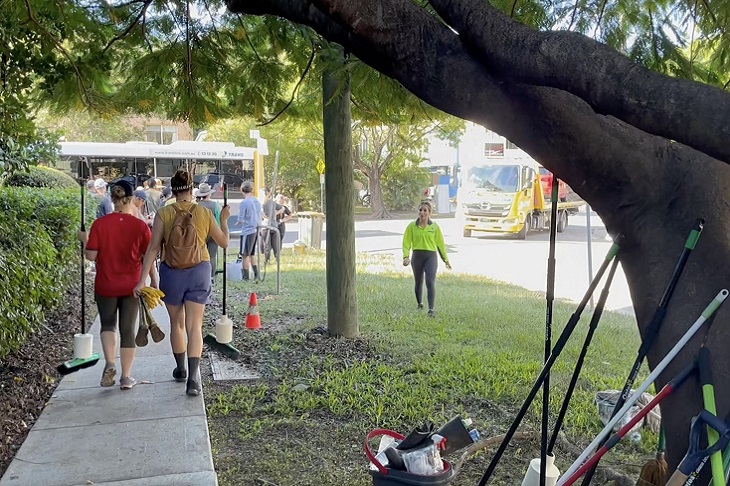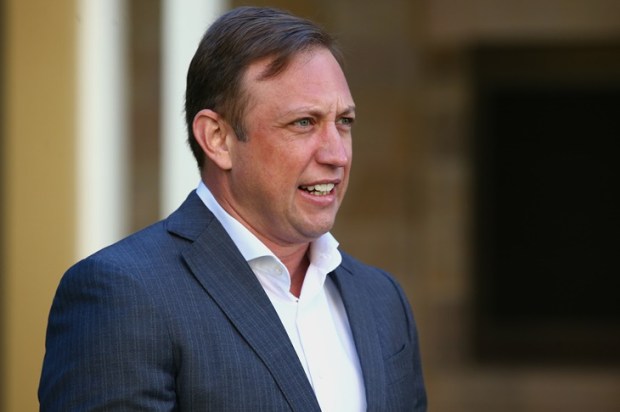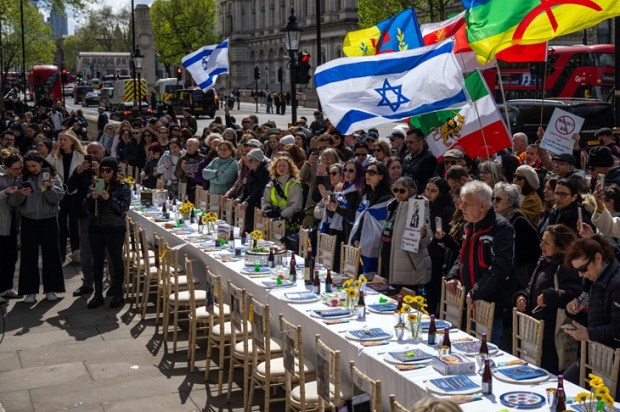It was 1.30pm on Saturday afternoon and the humidity was stifling – even for Brisbane.
‘Get some selfies for your campaign social media,’ my daughter advised, as I prepared to join the city’s Mud Army for the afternoon.
I’m running in the coming federal election with the Liberal Democrats for the Brisbane West seat of Ryan. Not being a fan of normally-unseen politicians suddenly posting regular selfies in mud-laden gumboots, broom in hand, doing the ‘community thing’, I was determined not to take any photos and post them online.
‘No,’ I said to my well-intentioned eldest, ‘I will not virtue signal!’
Little did I know there would be nothing to virtue-signal about, even if I had wanted to.
Shovel and broom in hand, I arrived at the nearby Mount Coot-tha ‘Mud Army Muster Station’ in the city’s western suburbs, set up by the Brisbane City Council to co-ordinate volunteers.
Very impressive, I thought. Perhaps government does have a more significant role to play in producing positive outcomes than my classical-liberal ideological leanings would ordinarily permit?
There was a table with a mountain of gardening gloves high enough to make the largest of Bunnings stores envious. Several rows of boxes with apples, pears, and bananas to allow Mud Army troops to fuel up for the task ahead graced one section of the room. A watercooler, sunscreen, insect repellent, and masks lined another row of tables.
‘Your safety briefing will be just over there,’ the friendly woman in a fluorescent orange vest informed me, pointing to some plastic chairs in rows in which about half a dozen other citizens sat, looking just as eager to get started as I was.
A young man began a scripted safety briefing that spoke in some detail about inches of mud, electrical hazards, nails, dead animals, distressed householders, and the importance of wearing gloves when moving heavy objects.
‘If you get even a tiny cut,’ he explained earnestly, ‘let your supervisor know and there is an immunisation clinic right here to give you a tetanus booster on your return.’ He pointed to a partitioned-off section at the back of the room with a laminated A4 sign that read ‘immunization’.
‘And there will be some quite distressing moments no doubt, so we do have a counsellor in place to talk to if you feel you need it when you get back,’ he warmly advised, motioning towards another partition with a laminated sign that read ‘counsellor’.
Okay, I thought. This is good. Quite well run. A little safety-ism isn’t always a bad thing. And then, at 2pm, we were instructed to wait outside for our supervisor and a bus. And so we waited. And waited.
Around 2.30pm, a very friendly gentleman named Craig, with a warm smile and Santa Claus coloured facial hair, gathered us in a tight semicircle to take down our names and phone numbers. Then he began reading from another script – another safety briefing… This one covered the same ground as the previous, but had more drama. ‘Some of the dead possums could be in very bad shape, so prepare yourselves,’ he warned. ‘Lots of items could have sharp and protruding elements, so be very careful when lifting,’ he asserted before launching into yet another script, this time relating specifically to correct heavy lifting practices.
And then came a statement that made the ancient journalistic hairs on my neck rise to attention in a neurological millisecond: ‘And if the media approach you, you are not allowed to speak to them.’
‘Excuse me?’ I interjected somewhat reflexively, ‘Why is that?’
I could feel the eyes rolling around me and imagined my fellow volunteers thinking ‘oh no, we’ve got one of those liberty nutjobs in our group’.
‘It’s just that I used to be a TV reporter in my youth, so I have a bit of an ethical issue with a government agency telling citizens that they can’t speak freely to the press,’ I quickly clarified, hoping that my noble stance in defence of modern liberty might impress my new acquaintances. It was in vain. More uncomfortable foot shuffles and eyes directed at feet ensued. ‘Never mind,’ I sheepishly retracted.
It was 3pm by the time the bus arrived to take us to a street of flooded houses in nearby St Lucia, a river-side inner-west suburb that had been badly inundated. Only it never got there. We made our way through the grounds of Queensland University then stopped at a nearby side street. Craig had been joined by other council officials and there was muttering and mobile phone chatter.
‘Okay, we’re just going to stop here and work on this street,’ he explained, pointing to a side-street that was dry, footpaths caked in dust, and residents’ belongings in piles by the roadside. ‘You’re not allowed to go into any properties now. And we’ll be leaving at 4pm.’
It was 3.30pm.
‘What’s the task then?’ asked a confused volunteer. ‘See how these piles of stuff have been piled up on the footpath by this morning’s Mud Army volunteers?’ explained Craig, ‘Well, some of it is spilling onto the road and some of it is blocking the footpath. We need you to make sure the piles are neat and footpaths are clear.’
A wise older gentleman I’d teamed-up with leant in, ‘This is the kind of job they give you when they don’t have anything for you to do, but don’t want to disappoint you.’ He was right. It was as futile as splitting rocks in a prison, but we obeyed at least for the first 15 minutes, not wanting to seem lazy.
‘Should we return tomorrow?’ asked the most eager of our group. ‘No, we’ve just received word that the marshaling centres won’t be opening tomorrow,’ Craig revealed.
At 4pm we were back on the bus and back at Mount Coot-tha 15 minutes later. ‘Great job guys, you’re real champions thanks so much for helping out!’ the well-meaning council co-ordinators cheered, as we disembarked, offering us cookies and fruit.
Over-engineered government solutions, I thought to myself. The absurdity of unintended negative consequences of well-meaning agencies butting-in where they don’t need to be. 2.75 hours of process execution, 0.25 hours of unproductive work. If that’s not a lesson in government waste and distorted priorities, nothing is.
I texted my Liberal Democrats federal election running mate and former Brisbane Lord Mayor during the 2011 floods, Campbell Newman. ‘Something’s up,’ I said, explaining what had happened. ‘They’ve suddenly reined the whole thing in it seems. A lot of the stuff on the side of the road looked very salvageable.’
‘In 2011, we just set up the systems and had a light-touch approach,’ Campbell replied, referring to the 2011 Mud Army that had emerged organically as a community goodwill initiative.
Saturday night, Brisbane’s Liberal-National Party Lord Mayor, Adrian Schrinner, announced that, ‘After sweeping through Brisbane’s flood-affected suburbs, and with the threat of afternoon storms tomorrow, we’re going to stand down our Mud Army 2.0 veterans.’
He told the ABC on Monday that there was also a liability risk for council and a safety risk for volunteers. ‘Having Mud Army volunteers walking right next to large excavators and trucks was a dangerous situation and we needed to protect them from that.’
Throwing out salvageable belongings also poses a liability risk, I thought. This was a case study in government interfering in a community initiative to make it ‘better’ only to destroy it.
All the council needed to do was set up a website or an app to connect those who needed help with those who wanted to help in their own areas. By keeping their nose out of things, the council could have helped facilitate a tremendously socially-beneficial community bonding effort, that makes everyone feel better in a crisis. By intervening, they killed the spirit of a great idea, replacing humanity with over-baked bureaucratic process.
‘Did you get a selfie for social media?’ my wife asked when I returned home. ‘The other candidates have been all over Facebook again.’
‘No!’ I stubbornly insisted. ‘I am not a career politician and I will not virtue signal!’
But I did get one heck of a lesson in small government liberalism…
Damian Coory is a former journalist for Ten News Sydney, ABC Queensland, and 3AW Melbourne and creator of The Other Side podcast. He is now the Liberal Democrats candidate for the upcoming federal election in the Brisbane seat of Ryan.
Got something to add? Join the discussion and comment below.
Get 10 issues for just $10
Subscribe to The Spectator Australia today for the next 10 magazine issues, plus full online access, for just $10.

























Comments
Don't miss out
Join the conversation with other Spectator Australia readers. Subscribe to leave a comment.
SUBSCRIBEAlready a subscriber? Log in